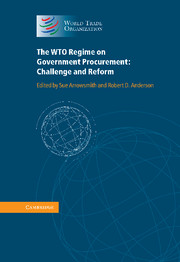Book contents
- Frontmatter
- Contents
- List of contributors
- Foreword by Pascal Lamy
- Perspective of the Chairman of the WTO Committee on Government Procurement, Nicholas Niggli (Switzerland)
- Preface
- Disclaimer
- PART I The WTO regime on government procurement
- PART II Expanding the scope of the Agreement on Government Procurement: accession and coverage
- PART III Revision of the procedural rules and other transparency provisions of the Agreement on Government Procurement
- PART IV Developing countries in the WTO procurement regime
- PART V Economic and social development (horizontal policies) in government procurement
- PART VI Enforcement and remedies
- 17 Constructing a system of challenge procedures to comply with the Agreement on Government Procurement
- 18 Designing effective challenge procedures: the EU's experience with remedies
- 19 The design and operation of a bid challenge mechanism: the experience of Hong Kong, China
- PART VII Multilateralism and regionalism
- PART VIII Challenges and new directions
- Index
- References
17 - Constructing a system of challenge procedures to comply with the Agreement on Government Procurement
from PART VI - Enforcement and remedies
Published online by Cambridge University Press: 07 September 2011
- Frontmatter
- Contents
- List of contributors
- Foreword by Pascal Lamy
- Perspective of the Chairman of the WTO Committee on Government Procurement, Nicholas Niggli (Switzerland)
- Preface
- Disclaimer
- PART I The WTO regime on government procurement
- PART II Expanding the scope of the Agreement on Government Procurement: accession and coverage
- PART III Revision of the procedural rules and other transparency provisions of the Agreement on Government Procurement
- PART IV Developing countries in the WTO procurement regime
- PART V Economic and social development (horizontal policies) in government procurement
- PART VI Enforcement and remedies
- 17 Constructing a system of challenge procedures to comply with the Agreement on Government Procurement
- 18 Designing effective challenge procedures: the EU's experience with remedies
- 19 The design and operation of a bid challenge mechanism: the experience of Hong Kong, China
- PART VII Multilateralism and regionalism
- PART VIII Challenges and new directions
- Index
- References
Summary
Introduction
As introduced in chapter 1, the Agreement on Government Procurement (GPA) concluded in 1994 (hereafter the ‘GPA 1994’) is a plurilateral agreement of the WTO, which applies only to those WTO members which have signed it. It requires GPA Parties to create a transparent and openly competitive government procurement system and to treat foreign competitors without discrimination for the purpose of opening up government procurement to international competition amongst themselves. To make the GPA provisions ‘more user friendly’ and to introduce some reforms, ten years after its entry into force the GPA was revised and a provisional revision of the text of the GPA (hereafter the ‘revised GPA’) was published in December 2006. Although the revised GPA is provisional, GPA Parties have agreed to use the revised text as the basis for accession negotiations. Thus, the relevant provisions contained in both GPA 1994 and the revised GPA will be discussed in this chapter. (When relevant, the articles of the revised GPA will be put into square brackets.)
To ensure enforcement of the GPA rules, in addition to strengthening the traditional intergovernmental dispute settlement mechanism, the GPA 1994 introduced a national challenge system for aggrieved suppliers, which is generally acknowledged as a very important innovation of the GPA 1994. The provisions on challenge procedures allow suppliers to challenge the procuring entity's decision before national review bodies, as discussed in detail below.
- Type
- Chapter
- Information
- The WTO Regime on Government ProcurementChallenge and Reform, pp. 483 - 510Publisher: Cambridge University PressPrint publication year: 2011
References
- 1
- Cited by

